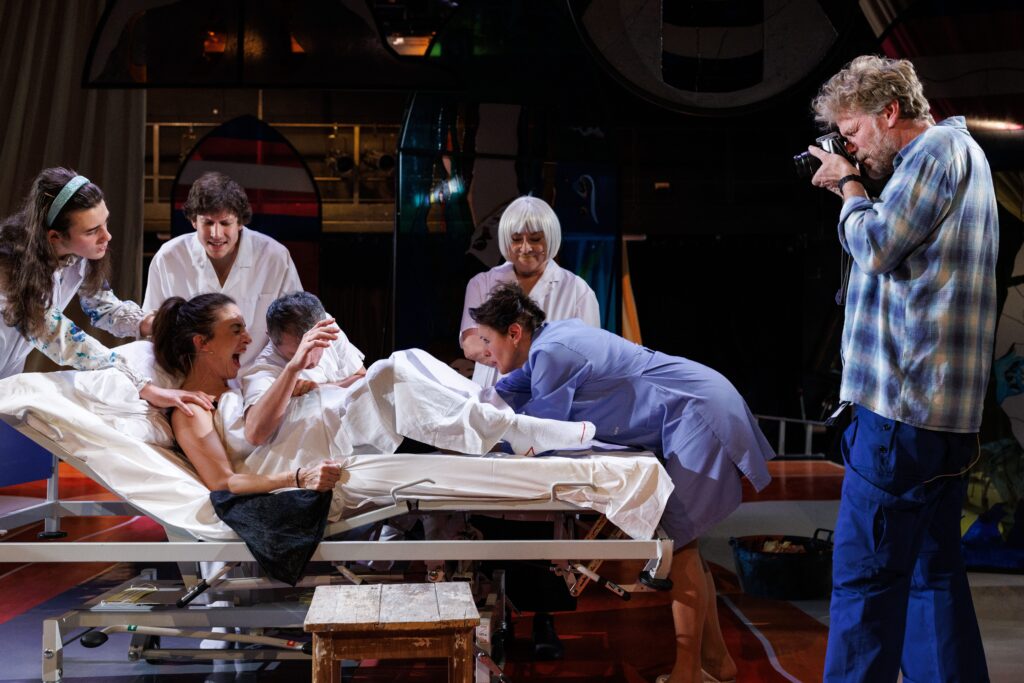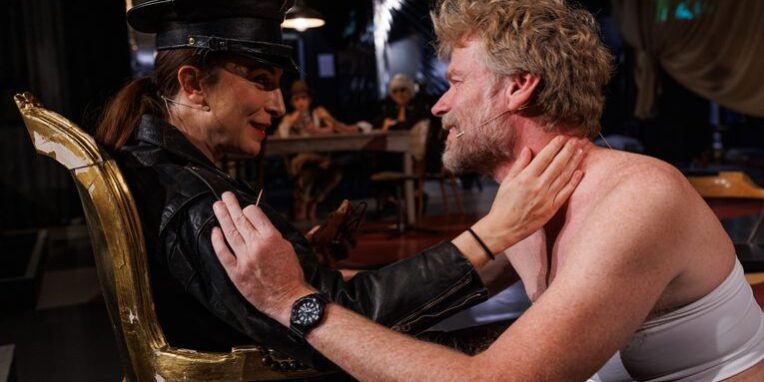Mladinsko Theatre, Ljubljana, premiere 9th December 2023
As children, what we consider to be ‘normal’ is influenced by who are family are and how they act. It is only when we grasp the concept of individuality, that we come to have our own experiences, thoughts and views on things, including what we consider to be normal; only then are we able to question our definitions as being (the only) right answer.
The Argonauts takes inside the lives of families that share one important aspect: none of them are considered “normal”. Polish director Michał Borczuch and dramaturg and writer Tomasz Śpiewak have adapted Maggie Nelson’s novel for Mladinsko Theatre. The book, which swings between autobiography and fiction, was heavily influenced by the author’s experience of pregnancy and motherhood.
Borczuch and Śpiewak’s adaption consists of three intertwining parts: sections drawn from the author’s experience of motherhood and their relationship with a transgender romantic partner, chats with AI Alice, who provides objective insights into the material, and finally documentary material, which the cast prepared themselves. The cast carried out interviews with families, couples and people that were not heteronormative relationships, a lesbian couple and their child, a gay couple and a girl with transgender boyfriend. They explore what it means to not be a part of heteronormative society. Some of this is not surprising at all: the lesbians for example, still get asked, which one of them plays the role of the man and which one of a woman, and face additional concerns about them being parents (because a child needs a father!).
The cast present these interviews in a documentary form, without extreme pathos or even a sign of personal stress. This method of exposition is very well done and makes for the strongest sequence in the play. The cast are careful with the personal stories they present to us and though they are in a “privileged” position, which could be a risky point of view to talk about the unprivileged, this did not leave us with a bad taste, as there was no sense of moral superiority that might have been the case in such a dynamic, with people who are not discriminated against talking about those who have faced discrimination.

Argonauts, Mladinsko Theatre
This thoughtfulness also extends to the manner in which these interviews were carried out. Everything is leaning towards the objective, with the actors sitting in an armchair and facing the camera as they tell the stories or answer questions. The armchair is turned towards the back of the stage, with the recorded footage projected onto the curtain, so the faces and gestures of the performers are kind of skewed. The scenography, by Dorota Nawrot, therefore seemed to both work well and not. The design consists of a few stained glass panels which, while they are mentioned by the cast, felt underutilised. Only once did someone touch them, and at one point someone hid behind them, but that was it. They did not contribute to the sense of atmosphere; the rest of the design was pretty bland with a basic table, random curtain and a lonely armchair. The stage was also extended into the audience area, which would make sense if they needed that space or if it was important for the story. However it feels like a missed opportunity to reference the Argo of mythology, and the associated philosophical question: “Does an object, after having had all of its original components replaced, remain the same object?”
This thought experiment exists parallel to the question of transgender people. Although there are plenty of animal species that do change their sex, transgenderism is still regarded as not “normal” or “natural” by some sections of society. The audience of the Mladinsko Theatre is however, more diverse than most; they are typically progressive and socially engaged, which begs the question of who this show is trying to convince?
The ensemble at the Slovensko mladinsko theatre remains one of the best around, even though, for a great part of the play, they are basically repeating the answers of their interviewees verbatim. Daša Doberšek, in the character of Maggie, regularly breaks the fourth wall and types on a computer, explaining the current situation or her internal experience of it.
The actors never impersonate the transgender people in the interviews, nor do they present stereotypical performances of gays and lesbians; they are not trying to pretend they completely understand their struggles. Yet all the energy and thoughtfulness that has gone into this performance can still not answer the question of why, for me. It provides only a glance at the LGBT+ community’s reality to an audience that, in all likelihood, already knows and thinks about these things.
Credits:
Direction: Michał Borczuch//Dramaturgy: Tomasz Śpiewak//Translation: Tatjana Jamnik//Set and costume design: Dorota Nawrot//Choreography: Dragana Alfirević//Music: Bartosz Dziadosz//Sound design: Bartosz Dziadosz, Sven Horvat//Lighting design: Robert Mleczko//Video design: Dušan Ojdanič
For more information, visit: Mladinsko.com
Further reading: an interview with Michał Borczuch: “When one side remains silent, the other side may get loud”
Živa Kadunc is a critic of contemporary performance art and a speaker on Radio Študent (Slovenia). She loves her plants.








